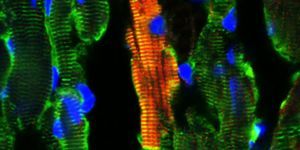Article
Stem Cells Could Help Repair Damaged Heart Muscle
Author(s):
New research has found that stem cells derived from human cord blood could be an effective alternative in repairing damage caused by heart attacks.

According to estimates from the World Health Organization, at least 20 million people survive heart attacks and strokes every year, but many have poor life expectancy. But new research has found that stem cells derived from human cord blood could be an effective alternative in repairing damage caused by heart attacks.
The study found that it is possible to expand rare stem cells (called CD133+) from human cord blood up to seven-fold in vitro and then grow them into cardiac muscle cells.
Given that cells obtained from adults following a heart attack may be less functional due to ageing and risk factors, the findings could have major implications on future treatment following a heart attack.
The study was headed by Raimondo Ascione, MD, chair of cardiac surgery and translational research in the School of Clinical Sciences at the University of Bristol in the United Kingdom. The study, which was published online recently in Stem Cell Reviews & Reports, was funded by the British Heart Foundation (BHF) and the National Institute for Health Research.
“We believe our study represents a significant advancement and overcomes the technical hurdle of deriving cardiac muscle-type cells from human cord blood. The method we have found has the attributes of simplicity and consistency. This will permit more robust manipulation of these cells towards better cell homing and cardiac repair in patients with myocardial infarction,” Ascione said in a statement.
“Our research suggests that in the future, stem cells derived from cord blood bank facilities might be used for repair after a heart attack.”
The double blind placebo-controlled trial has successfully recruited 50% of its patients, who have suffered a major heart attack, and there have been no safety concerns. Thirty-one of 60 patients have been injected with stem cells from their own bone marrow or a placebo into their damaged hearts during routine coronary bypass surgery.
The study focused on CD133+ stem cells that also present in adult bone marrow. There is also strong experimental evidence these cells derived from bone marrow may help with the regeneration of damaged heart muscle.
“Regenerative medicine research in the lab, alongside studies of patients, is absolutely crucial,” said Jeremy Pearson, MD, associate medical director at the BHF. “Right now, the damage to the heart caused by heart attack cannot be reversed. Through research like this across the UK, we hope to bring our vision of mending broken hearts to reality.”
“There has been interest for some time in the potential use of blood from the umbilical cord as a source of stem cells for therapy in a variety of diseases,” he added. “This study has shown for the first time that it’s possible to turn cord blood stem cells into cells that look like heart muscle, in the lab. The results are encouraging, but there are still lots of questions to answer before we’ll know whether these cells can be used successfully for heart repair in patients.”
SourceStem Cells from Cord Blood Could Help Repair Damaged Heart Muscle [University of Bristol]





